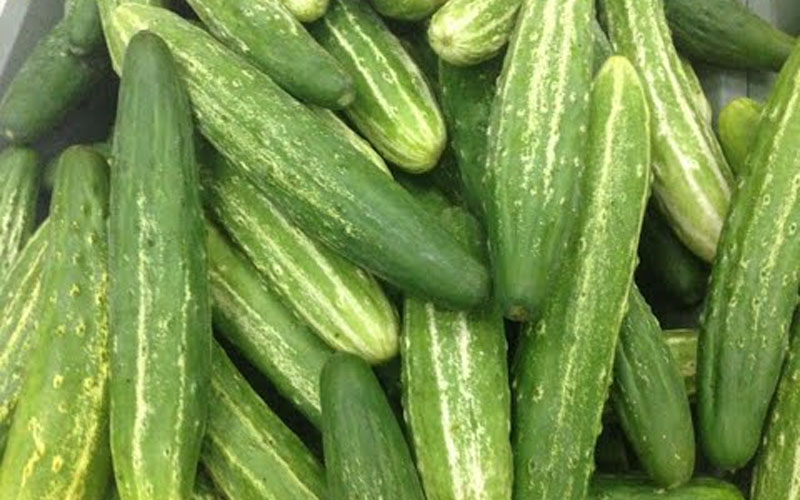Cucumbers contain many beneficial nutrients such as plant compounds containing antioxidants, low in calories, and rich in fiber. However, what should you pay attention to when eating cucumbers?
1. Nutrition from cucumber
Cucumbers are low in calories and contain many vitamins and minerals that are good for your health. A 300 g unpeeled cucumber contains approximately:
- Calories: 45
- Total fat: 0.3 g
- Carbs: 11 g
- Protein: 2 g
- Fiber: 1.5 g
- Vitamin C: 8 g
- Vitamin K: 49 micrograms
- Magnesium: 39 micrograms
- Potassium: 442 milligrams
- Manganese: 0.2 milligrams
Cucumbers have a high water content, being about 96% water. Nutritionists recommend eating unpeeled cucumbers to maximize the nutrient content. Peeling reduces the amount of fiber as well as some vitamins and minerals.
Cucumbers are loaded with antioxidants
Fruits and vegetables, including cucumbers, are particularly rich in beneficial antioxidants that may reduce the risk of diseases caused by the buildup of harmful free radicals in the body.
A 2015 study measured the antioxidant capacity of cucumbers by supplementing 30 older adults with cucumber powder. At the end of the 30-day study, the cucumber powder significantly increased several markers of antioxidant activity and improved antioxidant status.

Cucumber is a fruit that contains many nutrients.
Cucumbers promote hydration
Since cucumbers are about 96% water, they are especially effective at promoting hydration by replenishing your organs, helping you meet your daily fluid needs.
Cucumbers aid weight loss
Cucumbers are low in calories. This means that eating a lot of cucumbers will not add calories that lead to weight gain. The high water content of cucumbers may also aid weight loss.
A 2016 analysis that looked at 13 studies with a total of 3,628 people found that eating foods that are high in water and low in calories was associated with significant weight loss.
Helps Lower Blood Sugar
Several animal and test-tube studies have found that cucumbers may help lower blood sugar.
Cucumbers Aid Bowel Movement
Dehydration is a major risk factor for constipation, as it can alter the body’s water balance, making it difficult to have a bowel movement. Cucumbers are high in water, which promotes hydration. Staying hydrated prevents constipation and helps maintain regularity. Cucumbers also contain fiber, which helps regulate bowel movements, especially pectin, a soluble fiber found in cucumbers that helps increase bowel movement frequency.
2. Who should not eat too much cucumber?
Although cucumbers have many benefits, some people should be cautious or avoid eating cucumbers. People with digestive problems should eat a little at a time to feel if there is any reaction, especially people with irritable bowel syndrome, some people experience bloating, indigestion after eating cucumbers.
People with bleeding disorders or are taking blood thinners such as Jantoven (warfarin) should not eat too much cucumber. This is because foods rich in vitamin K such as cucumbers can interfere with the blood thinning process.
In addition, some people experience oral allergy syndrome when eating fresh fruits or vegetables that have proteins similar to pollen. This disrupts the immune system, causing an allergic reaction called cross-reaction.
3. What should you pay attention to when eating cucumbers?
The US Food and Drug Administration (FDA) said that recently, more than 150 people in 25 states and DC have been sickened by suspected Salmonella infection related to contaminated cucumbers. Investigators determined that a sample of cucumbers provided by Fresh Start Produce Sales, Inc., a Florida-based company, had the presence of Salmonella bacteria.
The FDA did not say how the cucumbers were contaminated with Salmonella bacteria in the above incident. However, in fact, the bacteria can enter vegetables through irrigation water, along with many other points in the food growing and processing chain. According to Associate Professor, Dr. Darin Detwiler, who teaches food policy at Northeastern University, research shows that contaminated irrigation water is one of the main reasons Salmonella bacteria enter fresh produce such as cucumbers and many other vegetables.
Although Salmonella infections are relatively mild for most people, in certain groups, infection with this bacteria can lead to serious illness.
Salmonella can be found in foods such as raw poultry, meat, and eggs, which is why it is important to cook these foods properly and kill any potential bacteria before eating.
Although peeling cucumbers is a way to reduce the risk of infection, eating cucumbers with the skin on is more nutritious. Therefore, before eating cucumbers, you should do the following:
- Wash your hands thoroughly before and after preparing fresh produce.
- If the fruit is slightly bruised, cut it off or, best of all, do not eat it if you suspect the bruise is unsafe.
- Even if you want to peel the cucumber, you still need to wash it thoroughly so that dirt and bacteria do not stick to the knife on the cucumber.
- Gently rub the cucumber under clean running water, rough fruits should be scrubbed with a clean vegetable brush under running water.
- Dry the cucumber with a clean cloth or paper towel to further reduce any bacteria that may be present.





